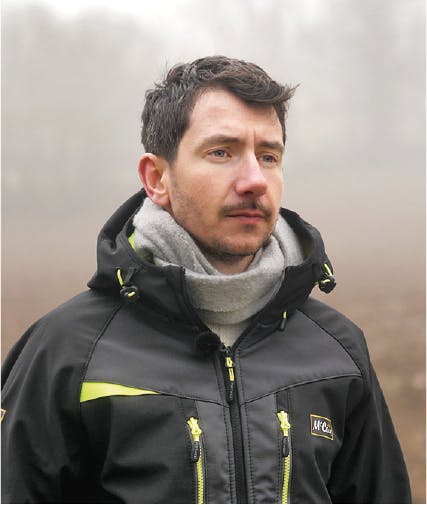
“Regenerative agriculture is an economically and ecologically relevant solution to adapt production to climate change.”
CAMILLE GUÉRIN
Senior Program Manager Regenerative Agriculture at McCain Continental Europe
“Grown in 150 countries, the potato is the third most widely consumed food on earth, after wheat and rice, with annual production exceeding 380 million tonnes(1). It uses simple sugars (glucose and fructose) produced by photosynthesis and converted to starch, that will then be stored in the tubers. These transformations are highly sensitive to temperature and humidity. Between planting in the spring and harvesting in the autumn, the potato is therefore vulnerable to variable and unpredictable weather conditions.
At McCain, we are directly observing this phenomenon, since we have lost between 6% and 10% of yields in Europe over the last decade, due to climate variations and soil erosion. As the success of our company is closely correlated with that of our 1,500 European partner producers, potato resilience is a strategic issue for us.
This is why we have embarked on an ambitious regenerative agriculture programme. This farming model aims to restore and improve soil health, biodiversity and ecosystems while continuing to produce quality food and secure yields. In other words, regenerative agriculture puts soil at the heart of the agricultural approach. Before potato planting, we are promoting the use of multi-species cover crop(2) and tillage reduction. Regenerative agriculture is thus outlining a way to adapt our production systems to climate change, which is relevant both economically and ecologically.
Convinced of the value of this new farming model, we are committed to implementing regenerative agriculture across our entire potato acreage by 2030. To achieve this objective, we are asking our partner growers to voluntarily commit to following precise specifications in return for our strong support. After launching in France in 2022 and the Netherlands in 2023, we rolled out this programme in Poland in 2024, in partnership with BNP Paribas Bank Polska, one of the leading supporters of the green transition in the country.
To encourage farmers’ commitment, our programme is structured around three components. The technical pillar aims, in close collaboration with local experts, to provide farmers with the keys to a successful transition by training them on topics such as soil life, cover crop management and crop diversification. In Poland, BNP Paribas Bank Polska is co-financing this support until 2027. As part of our commercial support, McCain offers them a three-year contract with a premium of €5 per tonne delivered from regenerative agriculture fields. Finally, on a financial level, BNP Paribas Bank Polska provides our farmer partners in Poland with a range of incentives, including a reduced interest rate and a cash advance service. BNP Paribas Bank Polska suggested that the latter measure, which is specific to our Polish programme, be included in our financial pillar to reward farmers for their efforts by paying their invoices immediately.
Three years after its first roll-out, our programme has proven its worth, with more than 50% of our farmer partners in continental Europe having at least completed the technical training provided. These convincing results have encouraged us to go even further, with the aim of onboarding 100% of them in France, the Netherlands and Poland while expanding to other countries in which we operate. The opposite of a passing fashion, regenerative agriculture is a structuring trend that is set to continue and expand.”
INTERVIEW CONDUCTED ON 10 MARCH 2025.
MCCAIN
Founded in 1957 in Canada by four brothers from a farming family, McCain Foods Limited is the world’s largest producer of frozen potato products and one of the world’s leaders in appetizers and snacking. A major player in production and distribution, the company employs around 22,000 people and operates 49 production sites worldwide. In continental Europe, McCain works in partnership with 1,500 farmer partners.
